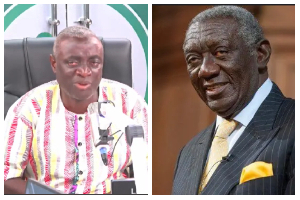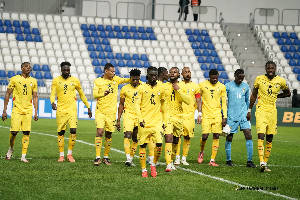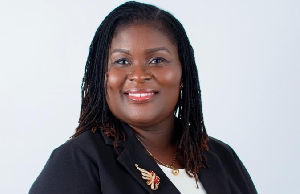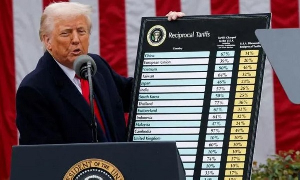By Kwame Okoampa-Ahoofe, Jr., Ph.D.
Garden City, New York
Oct. 3, 2015
E-mail: okoampaahoofe@optimum.net
If I recall, accurately, Mr. John Ndebugri, who is now staunchly and loudly championing the cause of the judges and magistrates indicted for abusing their offices through the criminal solicitation of kickbacks, was at some point in those early bloody years a cabinet appointee of the Rawlings-led Provisional National Defense Council (PNDC) so-called. Back then, Mr. Ndebugri was a cutthroat revolutionary who had absolutely no patience for the deliberate process of the judicial system. And so it is quite refreshing for me to encounter the man, once again, in media limelight, this time adamantly championing the cause of thoroughgoing corrupt judges and magistrates. I couldn’t care less about his grandstanding claim that he hasn’t collected a pesewa from any of his judicial clients as yet (See “Anas is a ‘Cabal’ and [an] Apparition” Starrfmonline.com / Ghanaweb.com 10/3/15).
The man is upset that the court would allow Mr. Anas Aremeyaw Anas, the trained lawyer cum reporter, whose meticulous and diligent undercover investigations delightfully exposed the fetid rot that is the country’s judicial system, to sport his trademark facial mask while taking the witness stand to back up his audiovisual documentary evidence that literally set Ghana’s judicial system ablaze. I hope that by the end of the ongoing fact-finding and prosecutorial process, our entire judicial apparatus would not have been razed to dust and ashes. The damage is quite enormous, regardless of any attempts by highly placed officials in government, including President John Dramani Mahama, to predictably and understandably play down the same. If Mr. Anas has been permitted by the court hearing the details of the evidence assembled against the indicted judges, it is not because Mr. Anas lacks the courage to directly confront the men and women whom he has forensically accused of corrupting the integrity of both their offices and the judicial system at large, but because in our kind of society, where the witness cannot be guaranteed any reliable security cordon around the clock, the least the court can do for Mr. Anas is to ensure that whatever protective measures he has been able to build around himself is not flagrantly violated by the State in the dubious name of judicial protocol or convention.
The case at hand is no ordinary matter; it regards the very heart and soul and integrity of the institution that provides our society and civilization with the necessary stability that it requires to thrive and progress. And by the dint of his courage and rarefied diligence, Mr. Anas easily elevated himself to the enviable status of a human institution, in much the same way that some of our leaders have immortalized themselves through their yeomanly and sacrificial contribution to the liberation and socioeconomic and cultural development of the country. And so, yes, sometimes legal protocol has to be tweaked a little bit in order to serve the greater long-term good of the people and the country at large, and not the parochial or selfish interests of a few rascals and miscreants of the kind that Mr. Ndebugri finds so compelling to go to bat for, gratis, as he claims.
Likewise, he has every democratic right to call his apparent legal arch-nemesis whatever name he desires, but the fact remains that the court does not in any way regard Mr. Anas as either an “apparition,” poltergeist or a “cabal.” Rather, it is his brazen and imperious decision to champion the rights of the indicted judges to criminally flout the oaths of their office that makes Mr. Ndebugri, rather than Mr. Anas, seem like one of the battalion commanders of the Sicilian Mafia. He must be fooling himself, if Mr. Ndebugri thinks that he can use legal technicalities to either bully the court or sway public opinion. What matters here are the facts regarding whether, indeed, any of the indicted judges committed the crimes they have been charged with, and not the relatively trivial question of whether Mr. Anas appeared before the court in a facial mask or a medieval gladiator’s armature. Ghana must be returned to her former glorious status of global respectability, once again. If this is genuinely the overriding professional objective of Mr. Anas, then who are we to complain or second-guess the young man?
Opinions of Sunday, 22 November 2015
Columnist: Okoampa-Ahoofe, Kwame














